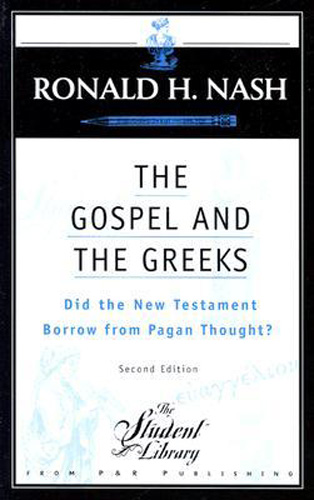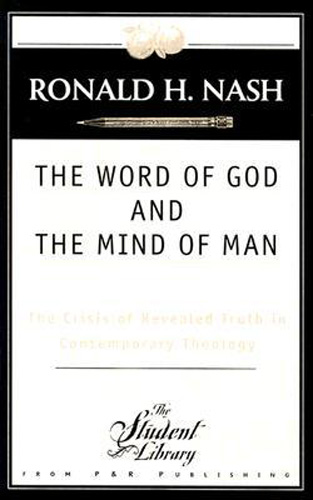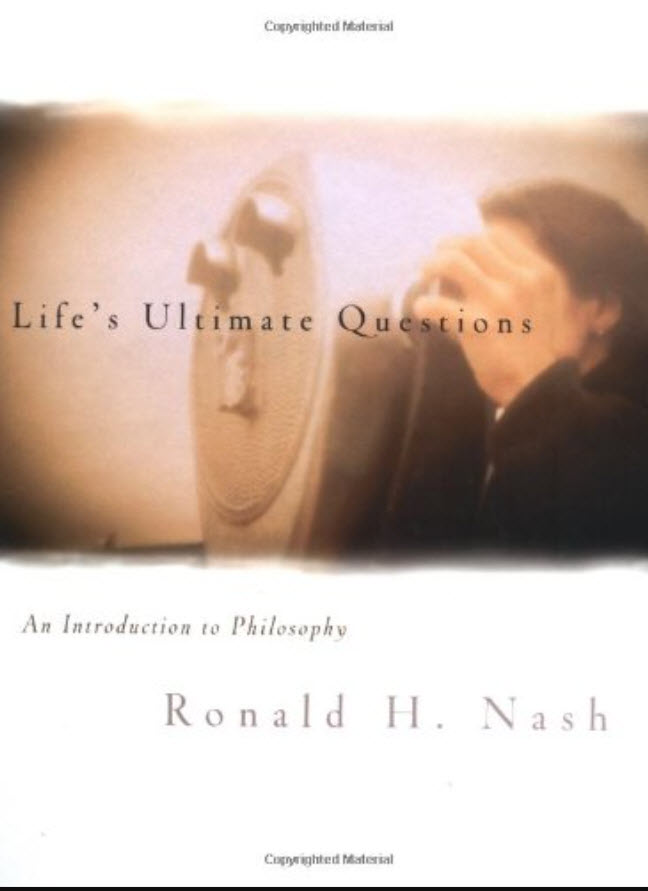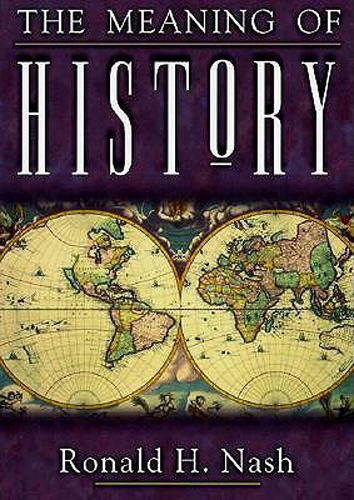History of Philosophy and Christian Thought - Lesson 19
Hellenistic Philosophy
Hellenistic philosophy was an approach that was popular from the fourth century BC to the fifth century AD.

Hellenistic Philosophy
Hellenistic Philosophy
Part 1
I. Introduction
A. Timeline
1. Naturalistic Period (585 - 450 B.C.)
2. Humanistic Period (450 - 322 B.C.)
3. Hellenistic Period (322 B.C. - A.D. 430)
B. Main Characteristic - Synthesis
C. Sterling Lamprecht, Our Philosophical Traditions
1. Hellenistic Philosophies, focus on salvation
2. Lamprecht's conclusion: Christianity was not unique.
3. Rebuttal: Galatians 4:4
Introduction
0% Complete- 0% Complete
Thales and Anaximander were two philosophers in the sixth century BC that lived in Miletus.
0% Complete - 0% Complete
Heraclitus and Pythagoras lived into the 5th century BC.
0% Complete - 0% Complete
Any worldview addresses the subjects of God, ultimate reality, human knowledge, ethics and human persons.
0% Complete - 0% Complete
Fundamental beliefs of a naturalistic worldview is that nothing exists outside the physical universe and that all things evolved.
0% Complete - 0% Complete
Plato was a student of Socrates and lived into the fourth century BC. He opposed hedonism, empiricism, relativism, materialism, atheism and naturalism.
0% Complete - 0% Complete
Plato described the universe as having three levels: the world of particulars, the world of forms, and the form of the good.
0% Complete - 0% Complete
Plato's view of the universe was dualistic.
0% Complete - 0% Complete
One of Plato's fundamental arguments is that the human soul is immortal.
0% Complete - 0% Complete
Evaluation of Plato's arguments and comparison of Plato's philosophy with biblical theology.
0% Complete - 0% Complete
Empiricism teaches that all human knowledge arises from sense experience. Rationalism teaches that some human knowledge does not arise from sense. experience
0% Complete - 0% Complete
Aristotle was a student of Plato and lived in the fourth century BC.
0% Complete - 0% Complete
Aristotle rejected Plato's doctrine of two worlds.
0% Complete - 0% Complete
Discussion of Aristotelian philosophy as it relates to the incarnation.
0% Complete - 0% Complete
Aristotle's philosophy as it relates to attributes of God and fundamental assumptions about psychology.
0% Complete - 0% Complete
Aristotle made a distinction between passive intellect and active intellect.
0% Complete - 0% Complete
Discussion of the strengths and weaknesses of the law of non-contradiction.
0% Complete - 0% Complete
Discussion of the nature and substance of matter.
0% Complete - 0% Complete
Hellenistic philosophy was an approach that was popular from the fourth century BC to the fifth century AD.
0% Complete - 0% Complete
Stoics were determinists who believed in living according to nature.
0% Complete - 0% Complete
Hedonism emphasized pleasure as the greatest good. "Eat, drink and be merry for tomorrow we might be dead."
0% Complete - 0% Complete
Philo's philosophy was based on a synthesis of Stoicism and Platonism.
0% Complete - 0% Complete
Implicit "Logos" Christianity is an underlying theme in the book of Hebrews.
0% Complete - 0% Complete
Plotinus lived in the third century AD and is considered the founder of Neoplatonism.
0% Complete - 0% Complete
Augustine is a Latin church father, is considered by many to be one of the most important figures in the development of Western Christianity.
0% Complete - 0% Complete
Augustine wrote Confessions as an autobiographical work to record his experience as a sinful youth and his experience becoming a follower of Christ.
0% Complete - 0% Complete
Augustine wrote to refute some heresies of the day by focusing on the concepts of faith and reason.
0% Complete - 0% Complete
Augustine writes about the problem of evil and describes evil as the absence of good.
0% Complete - 0% Complete
Augustine writes to refute Pelagianism by focusing on the biblical teaching about sin.
0% Complete - 0% Complete
Augustine writes to refute Donatism.
0% Complete - 0% Complete
The fundamental idea of skepticism is that no one can know anything. Augustine this statement contradicts itself because the skeptic is claiming that you can know that you can't know anything.
0% Complete - 0% Complete
When Augustine wrote "The City of God," he had a linear view of history.
0% Complete - 0% Complete
In Augustine's theory of knowledge, he says that eternal reason and human reason are two different levels of reason.
0% Complete - 0% Complete
Augustine was personally convinced of the importance of divine illumination.
0% Complete - 0% Complete
The intellectual background of Thomas Aquinas was influenced by the discovery of ancient manuscripts, the rise of universities, the rise of religious brotherhoods and the rise of Muslim philosophy.
0% Complete - 0% Complete
Aquinas describes faith as whatever a human can know through special revelation, and reason as whatever a human can know outside of special revelation.
0% Complete - 0% Complete
Aquinas attempts to prove God's existence.
0% Complete Aquinas describes four kinds of law as eternal, divine, natural and positive.
0% Complete- 0% Complete
The rationalists and empiricists set the stage for Kant and other philosophers of the modern era.
0% Complete - 0% Complete
Kant argued that moral requirements are based on a standard of rationality he dubbed the “Categorical Imperative."
0% Complete - 0% Complete
Kants two worlds are the phenomenal world and the noumenal world.
0% Complete - 0% Complete
Discussion of criticisms and questions about Kant's ideas.
0% Complete - 0% Complete
Similarities between Kant's ideas and postmodernism.
0% Complete - 0% Complete
The dialectic is a central idea in Hegel's philosophy.
0% Complete - 0% Complete
Ideally, Marxism begins with class struggle, then revolution, dictatorship of the proletariat, withering away of the state, and a utopian classless society.
0% Complete - 0% Complete
Discussion of four faces of Marxism.
0% Complete - 0% Complete
Nietzsche proclaimed that, "God is dead." His cure was to live life knowing there is no ultimate meaning. Kierkegaard emphasized a worldview based on true faith.
0% Complete
In this class, you will explore the rich history of philosophy and its relationship with Christian thought. The course begins with an introduction to the definition and importance of philosophy in Christian theology. You will then delve into the evolution of philosophical thought from the Pre-Socratic era, through the Classical Greek philosophers, and into the Hellenistic period. As you progress, you will discover how early Christian thought emerged and developed during the Patristic period, with a special focus on Augustine. The class continues with an examination of medieval Christian thinkers, such as Anselm and Thomas Aquinas, and concludes with an analysis of modern philosophers like Descartes, Kant, and Kierkegaard, and their influence on contemporary Christian thought.
Two other books that are recommended reading for this class are Confessions by Augustine and Phaedo by Plato.
Recommended Books
The Gospel and the Greeks: Did the New Testament Borrow from Pagan Thought?
Examines contemporary claims for Christian dependence on Hellenistic philosophy, Greco-Roman mystery religions, and Gnosticism. He finds the case for dependence in the...

The Word of God and the Mind of Man
The last two centuries of Christian theology are the record of an evolving attack on the role of knowledge in the Christian faith. The purpose of this book is to challenge...

Life's Ultimate Questions: An Introduction to Philosophy
Life's Ultimate Questions is unique among introductory philosophy textbooks. By synthesizing three distinct approaches

The Meaning of History
The Meaning of History is a concise look at the meaning of the history of the world from the viewpoints of major historians and philosophers. By examining the individual...

Dr. Ronald Nash
History of Philosophy and Christian Thought
th620-19
Hellenistic Philosophy
Lesson Transcript
We now come to the Hellenistic period of philosophy. Up to this point, we have looked at two parts of a of a broader outline. Okay. Just to refresh your memory, we the first part of this course was naturalistic philosophy, which covered the period of time from 585 B.C. to 450 B.C. and we could ask a question about 450 B.C. But the reason for fifties in there is because that's the that's the year in which Socrates was 20 years old and began his work in Athens. Obviously, 450 B.C. isn't is inaccurate because the animists the animists did their work throughout the lifetime of Socrates and Plato. All right. But that's that's naturalistic, period. Then we come to the humanistic period, and that would be 450 to 322 B.C. That would be the period of time that includes Socrates, Plato and Aristotle, and we call it the humanistic period, because the emphasis turns away from nature and naturalism to the study of the human, the place of a human being in the world. That Socrates, Plato and Aristotle. Now we come to the third major period of philosophy, and we call this the Hellenistic period, and it would begin with 322 B.C. That's the year in which Aristotle dies. And all of a sudden now we have a little problem. When does the hell, what is the Hellenistic period, what are its major features and when does it end? Now let me answer those questions by making a distinction between Hellenistic history, the Hellenistic period in history, versus the Hellenistic period in philosophy. There's a significant difference here. Prior to the death of Aristotle, philosophy is Hellenic.
[00:02:40] What's that mean? It means Greek. All right. This stuff is Hellenic. We're dealing with Greek thinkers. Hellenism is a growing synthesis between Greek elements and Roman elements. Strictly speaking, the period of Hellenistic history covers the time between the death of Alexander the Great. Which, of course would be 323 B.C., 323 B.C. when Alexander died. And what happened after Alexander's death? The empire that he had, that he had conquered and constructed broke up into four parts. There was Egypt. There was Greece and Macedonia. There was Asia minor. There were four parts to that empire. And this period basically ended in the year 30 B.C. with the death of Cleopatra. Once Rome conquers Egypt, which is the last vestige of the old Alexandrian empire, the next period of history would be the Roman Empire. All right. Rome becomes dominant throughout the Mediterranean world. But even though Hellenistic history terminates with the death of Cleopatra and her son that ends the Ptolemy reign, Hellenistic culture continues to survive Hellenistic culture, and that would include philosophy. So when will we end what is called the Hellenistic period of philosophy? Here's my suggestion that we view it going from 332 B.C. to 430 A.D. That is the death of Saint Augustine. Now that's utterly arbitrary. To some extent. You could date the end of Hellenistic culture before Augustine or later than Augustine, for example. If you wanted to do it, you could do it as late as 529 A.D., which is the year in which the Roman Empire finally does dissolve and collapse. The only problem by going as late as 529 A.D. is you've really only got one one significant thinker after Augustine, and that would be a man named Bowie Theseus. And he's not important enough to to really make that much of here.
[00:05:27] Okay. So now what is one of the major characteristics, perhaps the major characteristic of Hellenistic thought? It is this synthesis. There is very little new thinking that goes on, at least during these 300 years between the death of Alexander, the death of Aristotle and the death of Cleopatra. There is a lot of interesting thinking, but it's not very original, it's not very creative. It's largely a recycling of older ideas. Okay. Now, the year is 1950. Six. 1956. I have transferred from an earlier school that I attended. To Barrington College in Providence, Rhode Island, a school that no longer exists. It's been absorbed into Gordon College. During the summer before I took what would have been my senior year at Barrington College, I was off doing evangelistic work in in Great Britain. Very interesting time. But I went to Barrington not only to get a B.A., but to take some work in advanced theology and philosophy. So this was my first philosophy course. I was I was at that time a senior, and I was so moved by my first philosophy course that I decided to hang around a second year and get a major in philosophy before going on to Brown University. So we were using in 1956 a terrible history of philosophy text. There really was no history of philosophy book written by a Christian used by a Christian, or if there was, it was out of print. So we were using a hole and a horrible book called Our Philosophic Traditions, written by an Amherst University professor named Stirling Lamprecht, a guy who really hated the Christian faith. Okay. And we came to this part of his text and it was his purpose on one or two pages in the in the early part of that book to offer an argument why the Christian faith could not be a unique revelation from God, how in fact, the Christian faith was simply one of a number of Hellenistic systems that were engaged in a quest for salvation.
[00:08:23] This little chart, or a version of it was titled The Quest for Salvation. And what LAMB Prec did was name the five major Hellenistic systems and let's put them over here. There was stoicism, there was Epicureanism. It's what I have on your page there. There was skepticism. There was Neoplatonism and there was Christianity. Okay, so we have this and we have a chart that we're building, and then we have lines across the page from each of these five systems. And Lamprecht then explained each of these Hellenistic systems as a search for salvation from something to something by means of some particular way. Now, let me see what we have on our little chart. Stoicism. I've got them a little out of order here. Stoicism was a search for salvation from stress. And if you don't think deliverance from stress is important, you invite me over to some house, some to your house. Some day, when you're ready to bang your head against the wall. All right. This is this is bad stuff. It's a search for salvation from stress to tranquility by means of. And here's the Greek word, apathy. That's very close to our word, apathy. One way to achieve peace, deliverance from stress is by losing your interest in everything that we're going to see how the Stoics did that. Then Epicureanism was a search for deliverance from pain to pleasure. Remember, the Epicureans were hedonists. They said pleasure is the highest good by means of. And here's a different Greek word Ataraxia. There's a pill on the market called Ataraxia. All right. I don't know if it's still marketed or not, but for some people it's kind of an antidepressant that sort of calms people in the case of over nervousness or something else.
[00:10:42] Then we get skepticism. It was a search for salvation from error, two peace of mind. Notice here, all of these are Hellenistic systems. We're basically seeking the something very similar tranquility, peace of mind. Even pleasure was understood in a non dynamic kind of way here. Through destructive criticism. Through destructive criticism. Okay. Then Neoplatonism was a search for salvation from lesser being, whatever that means, to fuller being by means of mystical union with God. And then finally, Christianity. And here LAMB had it pretty close. Christianity is a search for salvation, from sin to justification. Now, I found that very interesting. This guy knew that the right word to fit in here was justification. Maybe he came from a Presbyterian background. All right. By means of grace Da Gama. He had. He had this much, right? Right. He may not have been a man. He may not have been an Armenian, but he certainly wasn't a Christian. Now, what was LAMB Project's conclusion? And there I was. You know, even though I was a senior, I was I was young and I was dumb and I was naive. And this was my first philosophy course. LAMB Perec's point here was this. Christianity was not unique. It was one of many. Hellenistic systems of the day, each of which was simply seeking salvation in a somewhat different way. This was a you know, for a lot of people, reading this for the first time could function as a dagger in the heart of your faith. Now, I don't recall my professor at that time, a game whom I still have great admiration for, a man named Carlton Gregory, an example of a very good guy who never published anything in his life, I guess, and but still had an enormous influence.
[00:13:19] But I don't think Carlton Gregory offered anything by way of rebuttal. So I said, I've got to come up with my own rebuttal, and here it is, and it still works. Is there a verse in Scripture? That offers a Christian response to the simplistic, anti-Christian claim that these similarities only show that Christianity. There was nothing new about Christianity. Yeah, and here's the verse. Galatians four four Galatians Chapter four verse for. Let me quote it to you from the King James version, because when you're my age, that's the only verse you remember. That's the only version you memorized. In the fullness of the time, God sent forth his son. Let me paraphrase that. When the world was ready, God sent forth his son when the stage was set. God sent forth his son. When the propitious, most propitious time of all had arrived. God sent forth his son. Don't view these similarities as an excuse to denigrate the gospel message. View the seamless similarities as a sign of God's marvelous providence. Listen to me. There had never been before, and there has never been since a period of time in the history of the human race when the world was so ready for a message of salvation. Salvation was on the minds of every thinking individual. Connect that up with what Paul says in Acts Chapter 17, where Paul goes to Mars Hill and there meets philosophers representing these various positions. Stoicism, epicureanism, skepticism. Neoplatonism is still to come. Neoplatonism doesn't come along till about 200 years later, and Paul preaches unto them. The gospel. He preaches unto them the resurrection of Jesus Christ. So what he's basically saying is, all of you people want to worship a God, and every one of your gods has a little statue on the road up to the top, and all of you are seeking salvation, but all of your saviors are dead.
[00:16:21] I'm here to talk to you about the Son of God who laid down his life as your substitute, who bore the burden of your sin, and to prove that he really is the one and only savior. He rose again from the dead.